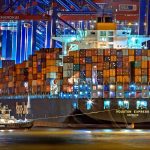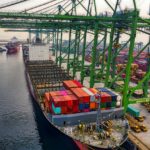Single COVID Case Shuts Down Major Chinese Port Terminal
Chinese authorities shut down a terminal at the third busiest container port in the world after a single positive COVID test. Yesterday, Eric Kulisch reported in American Shipper:
Chinese authorities on Wednesday closed a major container terminal at the Port of Ningbo after a dock worker tested positive for COVID, raising fears among traders that supply chain disruptions that occurred when Yantian terminal in Shenzhen reduced output by 70% for a month earlier this summer would be repeated.
All operations at the Ningbo Meidong Container Terminal, also referred to as the Meishan Terminal, were immediately suspended following the positive test results, according to local media reports and logistics operators.
Kulisch points out in the article that the Meidong Container Terminal is one of five terminals at Ningbo, and its shutdown effectively eliminates 20% of the port’s capacity.
Supply Chain Disruption
We’ve been talking about ocean freight carriers’ poor service (as freight rates have soared) a decent amount in Universal Cargo’s blog over the last year. The topic especially came up over the last couple weeks. On-time vessel arrivals from China to U.S. have been under 30%. I mentioned in the last blog, about the government going after carrier alliances, that carriers’ argue that exceptional circumstances from the pandemic and disruptions beyond their control to the supply chain are to blame for high rates and decreased reliability. As I said then, this argument should not be simply dismissed. This kind of disruption is beyond carriers’ control and does cause delays, not just at the Port of Ningbo but rippling through the supply chain. However, that does not mean carriers haven’t played a role in their own reliability issues as well. Frankly, ocean freight carriers have been notoriously unreliable and lacking in transparency long before the pandemic ever arrived.
Still, terminal shutdowns at major ports like this are disruptive events that there’s no way carriers could prevent. You don’t have to go back very far to see a similar situation have a serious impact on the world’s supply chains. In May, a partial shutdown at another busy Chinese port, Yantian, was supposed to be no big deal but turned into a majorly disruptive event as the partial shutdown lingered through June.
It wouldn’t take much for the partial shutdown at the Port of Ningbo to turn similarly disruptive as the one at Yantian Port. That exact topic is also covered in Kulisch’s American Shipper article:
“If something goes sideways in Ningbo, it’s going to be a real problem. At least as big, potentially, as what happened in Yantian,” a sea freight executive at a large logistics company said during a customer briefing American Shipper was privy to.
The freight forwarding division of C.H. Robinson told customers in an email notice to expect port delays and congestion.
Any lengthy closure could result in cargo diversion to other terminals and ports, putting a strain on their operations and exacerbating capacity challenges that have led to record shipping rates 10 times greater than normal for certain routes.
Bad Timing
Especially worrying is the fact that we’re right in the middle of international shipping’s peak season when more cargo is shipped from China to the U.S. than any other time in the year. This year, we entered peak season with port congestion already a major problem at U.S. ports. Additional disruption right now is the last thing shippers need.
Many shippers got ahead of this, after a year of extremely poor reliability from carriers and backups in the supply chain, starting the peak season early to ensure their goods would be imported in time for the back to school and holiday shopping seasons. However, even many shippers who thought ahead thusly are still waiting through heavy delays and cargo rolling to receive their goods. Watching yet another potentially highly disruptive event hit the industry is the last thing they need.
Unfortunately, results of this terminal shutdown are already being felt, as reported in Reuters:
Shipping company CMA CGM (CMACG.UL) put out a note on Thursday saying that some vessels will be re-routed to Shanghai or skip port calls at Ningbo. Hapag-Lloyd HLAG.DE expects the suspension in Meidong to cause delays in some planned sailings, according to a company statement.
Ports in nearby Shanghai, where many vessels are being re-routed, are seeing the worst congestion in at least three years. About 30 vessels are queuing outside Yangshan port, a key container terminal in Shanghai, Refinitiv data showed.
Fear Over Reason
Part of what makes this terminal shutdown crazy is it’s the result of only one positive COVID test. China’s very restrictive approach to COVID shows that any port, no matter how big, is at risk of being shut down at any time. A full blown outbreak is shown not to be needed when a single positive COVID test shuts down one of the world’s busiest container terminals. Additionally, there are no reports to even suggest additional tests were administered to ensure the test wasn’t a false positive.

Fear over COVID has been pushed to a point that there are probably many thinking, Good. I’m glad the terminal was shut down over a single positive test. However, we can’t shut down the world over fear of this virus. It’s highly contagious, yes, but it’s also highly treatable, and for the majority of people who get it – even the Delta variant – they suffer mild to no symptoms. That’s not to diminish the losses of people’s lives to the virus. Every death to a virus is serious. Deaths to a virus that was likely enhanced in a lab so it could infect humans rather than existing this way naturally in the world are tragic.
Still, we can’t allow ourselves to continue to compound the negative effects of the pandemic because of fear and grief. After 2020, we’ve seen lockdowns are not effective in fighting COVID. For those who are doubtful because they’ve only heard the voices reinforcing fear and pushing more governmental control and restrictions of freedoms, studies from around the world come to similar conclusions as the one by Rabail Chaudhry, George Dranitsaris, Talha Mubashir, Justyna Bartoszko, and Sheila Riazi of EClinicalMedicine that states, “lockdowns and wide-spread COVID-19 testing were not associated with reductions in the number of critical cases or overall mortality.”




